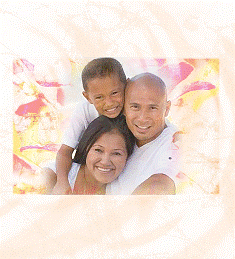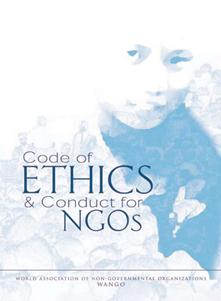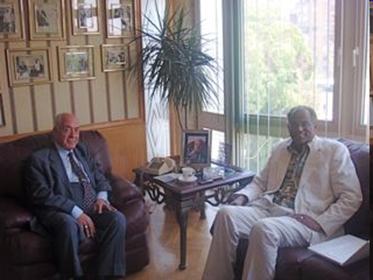
WANGO Unveils Code of Ethics of the Family
United Nations Headquarters, New York City
May 17, 2010

On May 17, 2010, at an event held at the UN Headquarters in New York for the International Day of Families, the World Association of Non-Governmental Organizations (WANGO) unveiled a Code of Ethics of the Family. This code of ethics and standards of good conduct of the family systematically identifies some of the key universal standards and ethical practices recognized by harmonious families and is designed to be broadly applicable to families worldwide. This was the first public release of this Code after a year of work by an international committee.
The Code was unveiled at a gathering
of UN diplomats and NGO leaders for the United Nations International Day of
Families Symposium, held on the theme of "The Impact of Migration on Families
Around the World." The event was organized by the Universal Peace
 Federation and
sponsored by the Permanent Mission of the Republic of Guinea, along with
the co-sponsoring Permanent Missions of Kazakhstan, Nepal, Nigeria, Qatar, Sri
Lanka, and Sudan. Dr. Frederick Swarts, Assistant Secretary General of WANGO,
presented the Code of Ethics of the Family in a powerpoint
presentation that also highlighted the importance of the family. Among other
speakers at the
symposium were H.E. Mr. Alpha Ibrahima Sow (Permanent Representative of the
Permanent Mission of the Republic of Guinea), H.E. Mr. Abdalmahmood Abdalhaleem
Mohamad (Permanent Representative, Sudan), H.E. Mr. Gyan Chandra Acharya
(Permanent Representative, Nepal), H.E. Miss Alya Ahmed S. A. Al-Thani
(Ambassador Deputy Permanent Representative, Qatar), , Dr. Thomas Walsh (President,
Universal Peace Federation); and Sharon Slater (President, Family
Watch International), among others. Remarks from UN Secretary General
H.E. Ban Ki-moon were read by WANGO Secretary General, Taj Hamad.
Federation and
sponsored by the Permanent Mission of the Republic of Guinea, along with
the co-sponsoring Permanent Missions of Kazakhstan, Nepal, Nigeria, Qatar, Sri
Lanka, and Sudan. Dr. Frederick Swarts, Assistant Secretary General of WANGO,
presented the Code of Ethics of the Family in a powerpoint
presentation that also highlighted the importance of the family. Among other
speakers at the
symposium were H.E. Mr. Alpha Ibrahima Sow (Permanent Representative of the
Permanent Mission of the Republic of Guinea), H.E. Mr. Abdalmahmood Abdalhaleem
Mohamad (Permanent Representative, Sudan), H.E. Mr. Gyan Chandra Acharya
(Permanent Representative, Nepal), H.E. Miss Alya Ahmed S. A. Al-Thani
(Ambassador Deputy Permanent Representative, Qatar), , Dr. Thomas Walsh (President,
Universal Peace Federation); and Sharon Slater (President, Family
Watch International), among others. Remarks from UN Secretary General
H.E. Ban Ki-moon were read by WANGO Secretary General, Taj Hamad.
 WANGO's
development of the Code of Ethics of the Family comes on the foundation of
WANGO's widely acclaimed Code of Ethics and Conduct
for NGOs. This NGO Code is a
set of fundamental principles, operational principles and standards to guide the
actions and management of NGOs. Originally formulated by a committee of NGO
leaders from 42 nations that began their work in 2002 and released the first
version in 2004, the Code was subsequently reviewed by leaders of the academic,
non-governmental, and governmental sectors in 140 nations and a revised version
was released in 2005. The Code of Ethics of the Family is likewise seen an a
work that will be further reviewed and revised.
WANGO's
development of the Code of Ethics of the Family comes on the foundation of
WANGO's widely acclaimed Code of Ethics and Conduct
for NGOs. This NGO Code is a
set of fundamental principles, operational principles and standards to guide the
actions and management of NGOs. Originally formulated by a committee of NGO
leaders from 42 nations that began their work in 2002 and released the first
version in 2004, the Code was subsequently reviewed by leaders of the academic,
non-governmental, and governmental sectors in 140 nations and a revised version
was released in 2005. The Code of Ethics of the Family is likewise seen an a
work that will be further reviewed and revised.
Unlike the Code of Ethics and Conduct for NGOs, which has numerous, detailed standards (132), the Code of Ethics of the Family is designed to be short and simple. It is designed so that individual families can discuss this code with their family members -- parents and children -- and either adopt it as it is or modify it to make a code individualized for their particular family. It is short enough that they can post it on their wall as a reminder of the basic principles that harmonious families share; their duties as parents, children, and siblings; and their responsibilities as a family to the larger society.
A copy of Code of Ethics of the Family can be found at www.wango.org/COEOF/COEOF.pdf
 Much of the inspiration for the Code
of Ethics of the Family can be attributed to H.E. Dr. Abdelaziz Hegazy, the
former Prime Minister of Egypt and current Chairman of the General Federation
of NGOs and Foundations. On May 11, 2009, in a private meeting in Cairo with
WANGO Secretary General Taj Hamad and Dr. Frederick Swarts, Dr. Hegazy
revealed his dream for the development of such a code. Subsequently, in an
address prepared for the 2009 International Day of the Families Symposium, an
event held on May 18, 2009 and attended by over 400 participants, Dr. Hegazy
re-affirmed this goal: "For this reason, we ask civil society organizations . .
. to call for the establishment of a code of ethics and standards of good
conduct for every family to follow, no matter where they are. The code will form
the basis for a social and sacred covenant that highlights the rights and duties
for the family and the individual.” After this earlier commemoration of the
International Day of the Families, a WANGO committee of NGO leaders and family
authorities began their deliberations to develop this Code.
Much of the inspiration for the Code
of Ethics of the Family can be attributed to H.E. Dr. Abdelaziz Hegazy, the
former Prime Minister of Egypt and current Chairman of the General Federation
of NGOs and Foundations. On May 11, 2009, in a private meeting in Cairo with
WANGO Secretary General Taj Hamad and Dr. Frederick Swarts, Dr. Hegazy
revealed his dream for the development of such a code. Subsequently, in an
address prepared for the 2009 International Day of the Families Symposium, an
event held on May 18, 2009 and attended by over 400 participants, Dr. Hegazy
re-affirmed this goal: "For this reason, we ask civil society organizations . .
. to call for the establishment of a code of ethics and standards of good
conduct for every family to follow, no matter where they are. The code will form
the basis for a social and sacred covenant that highlights the rights and duties
for the family and the individual.” After this earlier commemoration of the
International Day of the Families, a WANGO committee of NGO leaders and family
authorities began their deliberations to develop this Code.
The publication of the Family Code also initiates a new drive to have families worldwide adopt the code or utilize it for developing their own, such as The Code of Ethics of the Smith Family, The Code of Ethics of the Hamad Family, or a Code of Ethics of the Ikeno Family. It was announced at the conference that already a partnership was established with a US nonprofit to conduct a campaign to have 1 million US families adopt the Code or a version of the Code.


